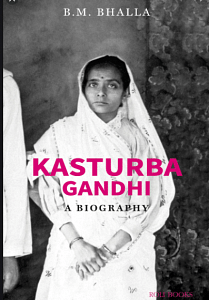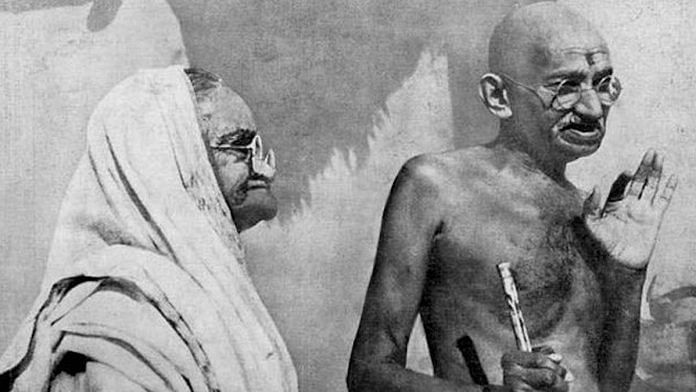Kasturba was sick of women who had started hovering around her husband and marginalized her, throwing her into the background. But during Gandhi’s stay at Lahore, where he was courting Sarladevi, there were also two foreign women in the ashram in Kasturba’s charge. They were the Dutch missionary Esther Faering and her teacher friend Anne Marie Peterson. Instant chemistry had also developed between them and Gandhi. For them, Gandhi was the incarnation of God in man, an ideal human being, the most spiritual and so the most powerful in the world.
Gandhi had ‘Indianized’ them as much as possible and made them members of his family. They were at the ashram while Gandhi was in Punjab and later on visiting different places all over India in the company of Sarladevi.
It was a trying and distressing period for Kasturba. Gandhi’s open courtship of Sarladevi was well known in the ashram and a lot of people were feeling concerned about Mahatma’s conduct. Kasturba shared her anxiety with many well-wishers. She could do nothing except resent her undignified rejection by her husband. She was irritated by the presence of these foreign women in the ashram. Gandhi had asked them to assist Kasturba in the kitchen. It is not clear what exactly the trouble between Kasturba and Esther was, but she complained to Gandhi about Kasturba’s behaviour.
Also read: When Mahatma Gandhi washed Kasturba’s soiled petticoat
It is shocking and revealing what Gandhi says about his wife and how he reacts when Kasturba resents his fascination with his foreign friends.
Commenting on this episode, Stanley Wolpert says:
The complexity of Gandhi’s life requires careful attention to both his public and personal trials. At fifty and on the eve of his greatest nationwide success in 1920, Gandhi experienced an intensely personal passion for young, golden-haired, blue-eyed Danish beauty, Esther Faering. Devout Christian missionary Esther fell in love with Mahatma Gandhi’s spiritual commitment to selfless service and left her Danish mission the day he agreed to permit his “Dear Child” to join his Sabarmati Ashram.
Acutely aware of how jealous Kasturba was of several of his adorning disciples, Gandhi tried at first to disarm his wife of such feelings by asking Esther “to help Ba in the Kitchen”. But he warned his “Dear Child” that “Ba has not an even temper. She is not always sweet. And she can be petty… You will therefore have to summon to your aid all your Christian charity to be able to return largeness against pettiness… To pity the person who slights you… And so, my dear Esther, if you find Mrs. Gandhi trying your nerves, you must avoid the close association I am suggesting to you.” It did not work, of course. Kasturba treated his “Dear child” so harshly in her kitchen that Ester soon broke down. “You were with me the whole of yesterday and during the night. I shall pray that you may be healthier in mind, body and spirit,” Bapu wrote to console Dear Child Esther, “with deep love.”… Gandhi was “glad you opened out heart” about his “difficult” wife. He immediately insisted that Esther must have a “separate Kitchen” for herself. “My heart is with you in your sorrow.”
Obsessed with thoughts of her wherever he was, Gandhi wrote a few days later, “Resist not evil” has a much deeper meaning than appears on the surface. The evil in Ba, for instance, must not be resisted, i.e., you or that matter I must not fret over it or be impatient and say to ourselves, “why will not this woman see the truth or return the love I give her?” She can no more go against her nature than a leopard can change his spots. If you or I love, we act according to our nature. If she does not respond, she acts according to hers.” He pleaded with her to “write to me daily”.
Obviously Gandhi was obsessed with this ‘golden-haired, blue-eyed Danish beauty’ and siding with her. He was set against his wife. He never wrote like this to any of his sons, as Wolpert points out, or his wife. His patriarchal mind took his wife for granted and did not grant her any modicum of autonomy. He was cocksure of the rightness of what he himself did. It seems Gandhi regretted that he could not marry one of these bright and pleasing women. He wrote many feverish letters to Esther, quoting psalms and poetic pleas and ardent confessions. How one wishes that he had extended his true Christian love to his wedded wife also. He forgot that Kasturba was under great strain about two simultaneous love affairs of her husband and her behaviour to his ‘Dear Child’ was informed by what he was doing.
Also read: Gandhi cursed ‘luscious’ mangoes he once loved because he wanted to transcend sex & desire
While he was writing these ‘love’ letters to Esther, he was still obsessing over Sarladevi, that was a much more serious affair and a threat to the existence of Kasturba in the life and family of Gandhi.
This romance was being enacted in the open according to Gandhi’s usual practice and the page of Young India were reporting how Sarladevi’s khadi saris had attracted Indian women even from the most conservative places. Gandhi fantasized about how he and Sarladevi could together be a tremendous political force – he as the law-giver and she as the Shakti of Indian womanhood, representing the artistic and aesthetic strength of our culture, inspiring and empowering him to mobilize the vast and diverse masses of India. He found all virtues in her. He published her poems and reproduced her lectures and reported the impact of her singing on the audiences in his weekly papers.
The unease among the close associates and inmates in the ashram was increasing. Kasturba was rattled and confused. Gandhi had become indifferent, unduly critical and dismissive of her. He mocked her publicly. Kasturba had no choice but to react, resist and fight. Gandhi told Maganlal Gandhi that Kasturba was partial in dealing with the members of her own family. Kasturba said that he had shown unreasonable hostility towards Harilal. Gandhi’s rejection of Kasturba came to the extent of his remarking, ‘Her staying in the Ashram is in vain’. Gandhi’s dissatisfaction with Kasturba surfaced off and on whenever Kasturba asserted her own individuality and resisted his arbitrary demands. He had resisted her on the question of the education of her sons, untouchability, khadi and the harsh life in the ashrams.
Erikson remarks that Gandhi’s attitude smacked of ‘rare vindictiveness towards Kasturba, who could not become your [Gandhi’s] intellectual equal.’ According to him, ‘Kasturba’s strength of renunciation was, if anything, more consistent than yours [Gandhi’s].’20 In two letters written by Gandhi on 16th and 24th January 1920 to Narahari Parekh, he complained about Kasturba’s ‘pettiness’ and ‘bad temper’ and how she had ‘obstructed many [of his] plans’ due to her nature, negative attitude and intellectual incompatibilities.
Kasturba was capable of sizing up the situation pragmatically. She also made the decision to reduce herself consciously to almost ‘nothingness’. That is, she put no demands on her husband, which ultimately convinced Gandhi of her strength, power, and love. Sarladevi, on the other hand, resented the attitude of the ashramites and other associates of Gandhi, who now advised her to surrender to the ways of the ashramites. This was not the temper and approach of Sarladevi. To Gandhi’s admonition that she should be deserving of the ‘love and affection’ of his associates, she responded that she should not be sermonized and treated like a schoolgirl.
 Excerpted with permission from Roli Books from Kasturba Gandhi: A Biography by B.M. Bhalla. Paperback, ₹395.
Excerpted with permission from Roli Books from Kasturba Gandhi: A Biography by B.M. Bhalla. Paperback, ₹395.




ये महात्मा नही दुरात्मा गांधी था। ये देशद्रोही भारत को रक्तरंजित करके भारत के टुकड़े-टुकड़े करने वाला क्रूर हत्यारा था
Mahatma Gandhi was treated as God in our country. Nobody can comment on him. Nobody can criticize him- not permitted. But one thing should be kept in mind that he was human being and susceptible to commit mistakes and blunders which he really did.
There were a large numbers of similar personalities in those time who were sidelined by the sycophants. Mahatma Gandhi had a dictatorial approach in everything and forced others to comply with his biggest tool of ANASHAN.